ITALIAN ATTACK ON GREECE STUNS HITLER
Rome, Italy • October 28, 1940
In early October 1940 Romanian strongman Gen. Ion Antonescu gave Adolf Hitler permission for the German Wehrmacht (armed forces) to occupy his country. Hitler’s Axis partner Benito Mussolini was caught off guard by the news, and the Italian public reacted negatively. For years the Italian dictator and his countrymen had considered Romania to lie within their sphere of influence. In a fit of pique, Il Duce (Italian, “the leader”) announced in a war council meeting on October 15 that he would “occupy” Greece in a two-week campaign launched from Italian-occupied Albania on this date, October 28, 1940. As a way of evening the score, he’d let Hitler read about his fait accompli in the Berlin newspapers! The cover story—the casus belli given to the Greeks in Italy’s three-hour ultimatum before launching its invasion—was that Greece had been in violation of its obligation as a neutral country to not collaborate with Italy’s enemies. Truth be told, though, it was shortly after Nazi Germany had defeated France several months earlier, in June 1940, that Mussolini became fixated with adding Greece to his “Mare Nostrum” (Latin, “Our Sea”), a geostrategic concept comparable to what Hitler wished to think of as Germany’s rightful “Lebensraum” (meaning “spatial expansion”) in Eastern Europe.
It was a head-slapping blunder. Outnumbered almost 2-to-1 by Greek defenders, Mussolini’s invasion force—ill-prepared, poorly led, and insufficiently equipped—was easily pushed back into Albania by better-disciplined, better-motivated, and better-equipped Greek forces. The Italian “Blitzkrieg” (German, “lightning war”) on Greece, which Hitler only learned about while en route to a meeting with Mussolini in Florence, Italy, petered out in mid-November 1940, the same month the British deployed squadrons of the Royal Air Force on the Greek mainland. The Italian setback appeared to endanger Hitler’s forthcoming crusade against the Soviet Union (Operation Barbarossa) by needlessly riling the neutral Balkan states and Turkey, inadvertently sucking British RAF and (later) Commonwealth ground forces into the unstable Greco-Italian mixture, to say nothing of throwing a huge monkey wrench into the Wehrmacht’s logistical timetable in the East.
The subsequent coordinated German assaults on Greece and its northern neighbor Yugoslavia in early April 1941—or Hitler’s rescue of Mussolini’s “madness,” as he referred to it—had the unintended consequence of German military meddling in Italy’s Mediterranean realm, Mussolini’s “Mare Nostrum.” Hitler’s intervention in Greece and the Balkans thus turned into a bigger disaster for Italy than Mussolini ever could have imagined—one that culminated in his country’s destruction by sparring German and Allied armies on Italian soil between 1943 and 1945.
Italian invasion of Greece Ignites the Greco-Italian War, 1940–1941
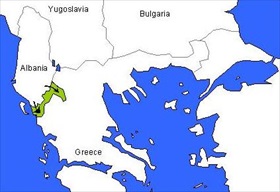 | 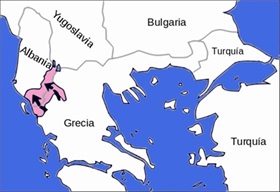 |
Above: Mussolini sent the Italian Army eastward across the Adriatic Sea into Albania in early April 1939, after which the impoverished country of just over one million people was incorporated in the Italian Empire (Impero Italiano) and ruled by a viceroy of King Victor Emmanuel III. The Italian Army, initially deployed on the Albanian-Greek border, launched a major offensive against Greece on October 28, 1940. After a two-week conflict, Greece managed to repel the invading Italians. Beginning on November 9, 1940, Greek forces launched a major counteroffensive and penetrated deep into Albanian territory.
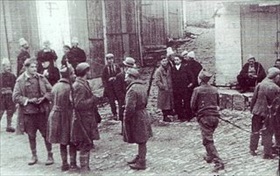 | 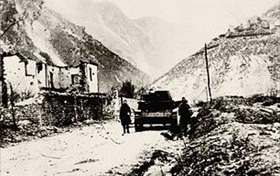 |
Left: Greek soldiers in Gjirokastra, Southern Albania, in December 1940, after pushing the Italians out of Greece. Early that same month the Greek military command worried about the possibility of German intervention in support of that country’s Axis treaty partner, Italy, and so they attempted to hasten their advance. However, Italian reinforcements in January 1941 halted the Greek counteroffensive.
![]()
Right: Greek operations culminated with the capture of the strategically important Klisura Pass in Southern Albania on January 10, 1941. Soon the front lines stabilized, broken only after Hitler’s intervention in April 1941, Operation Marita.
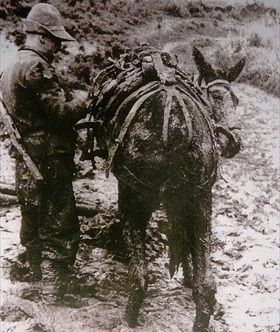 | 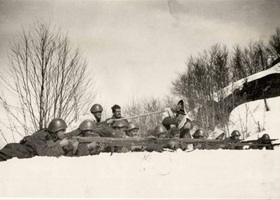 |
Left: Emblematic of the campaign in Greece, a member of one of three mountain infantry regiments in Italy’s 3rd Alpine (Alpini) Division “Julia” struggles with his mule in deep mud during the Greco-Italian campaign in 1940–1941. Following their debacle in Greece, the three Italian Alpine divisions that comprised the Alpine Corps saw service on the Eastern Front in 1942–1943 as part of the 235,000-man Eighth Italian Army in Russia, or ARMIR (Armata Italiana Russi). Mussolini disbanded ARMIR in February 1943, railing it home after it sustained heavy losses, including 64,000 who entered Soviet captivity. Of the ill-suited 57,000 Alpine troops who fought in the vast, flat expanses of Russia, only 11,000 returned home.
![]()
Right: A unit of the Greek Army during Italy’s 1941 offensive, codenamed Primavera (“Spring”). The Italians wanted to achieve success on the Albanian front before the impending German intervention in Greece and Yugoslavia. Under Benito Mussolini’s personal supervision they launched a determined attack that lasted from March 9 to March 20, but it failed to dislodge the Greeks. The stalemate continued until the German attack on Greece from Bulgarian territory on April 9, 1941 (Operation Marita). The Greek high command ordered a withdrawal from Albania on April 12. Later that month German, Italian, and Bulgarian forces overwhelmed Greek and British Commonwealth defenders, and the Germans raised their swastika flag over the Acropolis in Athens on April 27, 1941. The three Axis combatants occupied Greece for the next four years.
Outbreak of the Greco-Italian War: The Invasion of Greece
![]()

 History buffs, there is good news! The Daily Chronicles of World War II is now available as an ebook for $4.99 on Amazon.com. Containing a year’s worth of dated entries from this website, the ebook brings the story of this tumultuous era to life in a compelling, authoritative, and succinct manner. Featuring inventive navigation aids, the ebook enables readers to instantly move forward or backward by month and date to different dated entries. Simple and elegant! Click
History buffs, there is good news! The Daily Chronicles of World War II is now available as an ebook for $4.99 on Amazon.com. Containing a year’s worth of dated entries from this website, the ebook brings the story of this tumultuous era to life in a compelling, authoritative, and succinct manner. Featuring inventive navigation aids, the ebook enables readers to instantly move forward or backward by month and date to different dated entries. Simple and elegant! Click 











